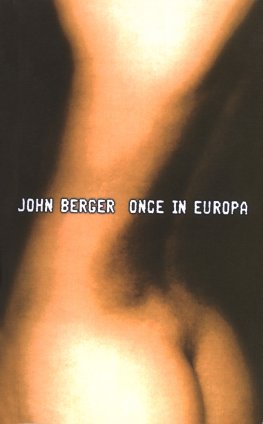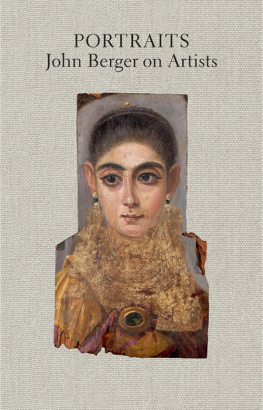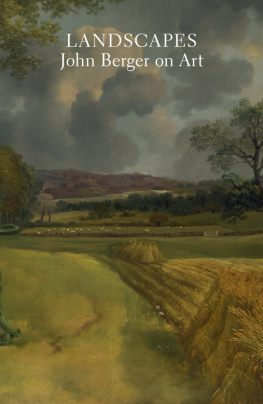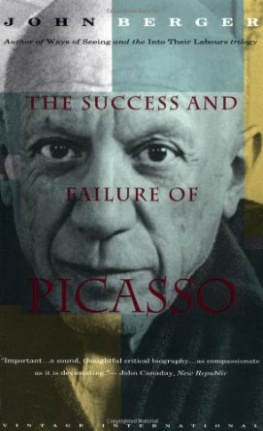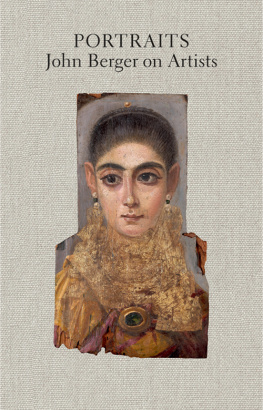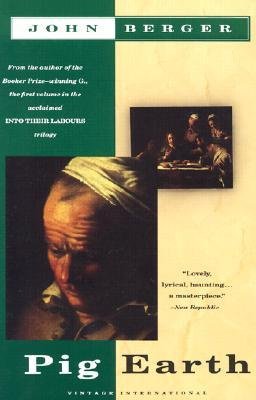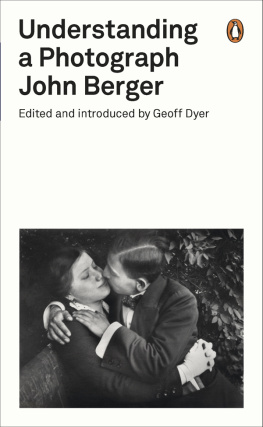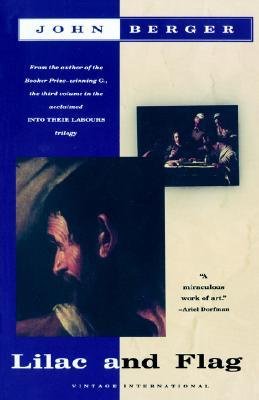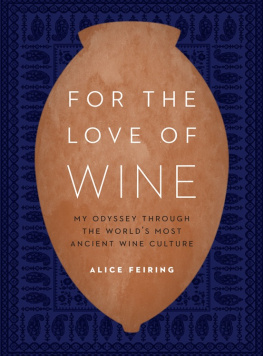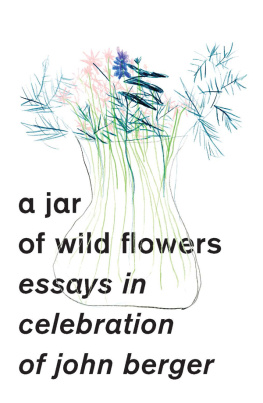John Berger - Once in Europa
Here you can read online John Berger - Once in Europa full text of the book (entire story) in english for free. Download pdf and epub, get meaning, cover and reviews about this ebook. year: 2014, publisher: Bloomsbury Publishing, genre: Prose. Description of the work, (preface) as well as reviews are available. Best literature library LitArk.com created for fans of good reading and offers a wide selection of genres:
Romance novel
Science fiction
Adventure
Detective
Science
History
Home and family
Prose
Art
Politics
Computer
Non-fiction
Religion
Business
Children
Humor
Choose a favorite category and find really read worthwhile books. Enjoy immersion in the world of imagination, feel the emotions of the characters or learn something new for yourself, make an fascinating discovery.
- Book:Once in Europa
- Author:
- Publisher:Bloomsbury Publishing
- Genre:
- Year:2014
- Rating:3 / 5
- Favourites:Add to favourites
- Your mark:
- 60
- 1
- 2
- 3
- 4
- 5
Once in Europa: summary, description and annotation
We offer to read an annotation, description, summary or preface (depends on what the author of the book "Once in Europa" wrote himself). If you haven't found the necessary information about the book — write in the comments, we will try to find it.
Once in Europa — read online for free the complete book (whole text) full work
Below is the text of the book, divided by pages. System saving the place of the last page read, allows you to conveniently read the book "Once in Europa" online for free, without having to search again every time where you left off. Put a bookmark, and you can go to the page where you finished reading at any time.
Font size:
Interval:
Bookmark:
John Berger
Once in Europa
FOR NELLA
Others have laboured and ye are entered into their labours.
ST JOHN 4-38The Leather of Love
Weathered as gate posts
by departures
and the white ghosts
of the gone,
wrapped in tarpaulins,
we talk of passion.
Our passions the saline
in which hides are hung
to make from a hinge of skin
the leather of love.
The Accordion Player
Will you play at my wedding? Philippe the cheesemaker asked him. Philippe was thirty-four. People had been saying he would never get married.
When is it?
Saturday next.
Why didnt you ask me before?
I didnt dare. Will you?
Where does the bride come from?
Yvonne comes from the Jura. Drop into the Republican Lyre tonight and shell be there her parents have come and some friends from Besanon.
The same evening the accordionist, a man in his fifties, found himself sitting in the caf, drinking champagne offered by the brides father, next to a plump woman who laughed a lot and wore dangling earrings. The accordionist had been looking hard at the young bride and he was sure she was pregnant.
You will play for us? Philippe asked, filling up the glasses.
Yes, Ill play for you and the Yvonne, he said.
On the floor at his feet lay a dog, its coat turned grey with age. From time to time he caressed its head.
Whats your dogs name? asked the woman with earrings.
Mick, he said, hes a clown without a circus.
Hes old to be a clown.
Fifteen Mick is, fifteen.
You have a farm?
At the top of the village a place we call Lapraz.
Is it a big farm?
Depends whos asking the question, he answered with a little laugh.
Delphine is asking you the question.
He wondered if she was often drunk.
Well, is it a big farm? she asked again.
One winter the Mayor asked my father: Have you got a lot of snow up at Lapraz? And do you know what Father replied? Less than you, Mr. Mayor, he said, because I own less land!
Thats beautiful! Delphine said, knocking over a glass as she put a hand on his shoulder. No fool, your father.
Have you come for the wedding? he asked her.
Ive come to dress the bride!
Dress her?
It was me who made the wedding dress and there are always finishing touches to make on the Great Day!
Are you a dressmaker? he asked.
No! No! I work in a factory I just pin things up for myself and friends.
That must save you money, he said.
It does, but I do it because it amuses me, like you play the accordion, they tell me
You like music?
She disentangled her arms and held them wide apart as though she were measuring a metre and a half of cloth. With music, she sighed, you can say everything! Do you play regularly?
Every Saturday night in the caf, weddings excepted.
This caf?
No, the one at home.
Dont you live here?
Lapraz is three kilometres away.
Are you married? she asked, looking him straight in the eye. Her own eyes were grey-green like the jacket she was wearing.
Unmarried, Delphine, he replied. I play at other mens weddings.
I lost my husband four years ago, she said.
He must have been young.
In a car accident
So quick! He pronounced the two words with such finality that she was silenced. She fingered the stem of her glass, then lifted it to her lips and emptied it.
You like playing the accordion, Flix?
I know where music comes from, he said.
That it was going to be a bad year had been evident to Flix from the moment in the spring when the snow thawed. All around the village there were pastures which looked as though they had been ploughed up the previous autumn and they hadnt been. In the orchards the fruit trees were growing out of mud instead of grass. The earth everywhere was like an animal whose fur was falling out. All this was due to the invasion of the moles. Some maintained that the moles had multiplied so catastrophically because the foxes had died or been shot the year before. A fox eats thirty or forty moles a day. The foxes had died because of the rabies which had been brought to our region from the distant Carpathians.
He was standing motionless in the garden in front of his house. Across his body he was holding a spade. He had been like that for ten minutes. He was looking at the earth just ahead of his boots. Not a grain of soil stirred. Towards the mountain, a buzzard was circling, otherwise nothing in sight was moving. The leaves of the cabbages and cauliflowers in the garden were wilted and yellow. With one hand he could have lifted any one of these plants off the earth, as you lift a candlestick off a table. All their roots had been severed.
When he saw the soil stir, he raised his spade and struck, grunting as the spade entered the earth. He kicked the soil away. There were the disclosed tunnels and the dead culprit mole.
One less! he said, grinning.
Albertine, Flixs mother, was watching her forty-year-old son through the kitchen window when he killed the mole with the spade. She shouted to him to come in because the meal was on the table.
With todays sun, she said whilst they were eating, the potatoes shouldnt be dirty.
They shouldnt be, he replied.
The pup under the table looked up, hoping for a bone or some cheese-rind. He was large and black with blond marks shaped like almonds over each eye which made him look comic.
Ah, Mick! said Flix, our Micks a clown without a circus, isnt he?
If you like, said Albertine, Ill make potato fritters tonight.
With cabbage salad! He took off his cap and smeared his sleeve across his hot forehead. Why not?
Years before, when Albertine had been strong enough to work in the fields, they used to lift the potatoes together. Whilst working they would recite all the ways in which potatoes could be eaten: potatoes in their jackets, potatoes with cheese in the oven, potato salad, potatoes with pork fat, mashed potatoes with milk, potatoes cooked without water in the black iron saucepan, potatoes with leeks in the soup and, best of all, potato fritters with cabbage salad.
The potatoes, unearthed that same morning, had dried well in the sun on the topsoil of the field. As Flix gathered them by hand into buckets, he sorted them. The small ones for the animals and poultry, the large ones for the table. Sometimes he moved forward stooping, sometimes he knelt between the rows and went forward on his knees, like a penitent. Mick, panting in the heat, lay on the ground and each time Flix moved forward, he accompanied him. When the buckets were full the man emptied the potatoes into sacks along the side of the field. The sacks were of strong white plastic and had contained fertiliser. When they were full, they looked liked praying drunks in white shirts.
Suddenly the dog became alert, his head down, nose in the broken earth. Breathing out heavily, he started to scrabble with his front paws and to scatter the soil behind him.
Fetch him! Mick, fetch him! Flix sat back on his heels to watch the young dog. He was happy to be diverted and to rest his back, which ached. The dog continued to dig excitedly.
You want him, Mick, dont you?
At last the dog deposited a mole on the earth.
You have him, dont let him go!
The dog tossed the mole into the air. For an instant the little animal in its grey fur coat, measuring fifteen centimetres in length and weighing a hundred and fifty grammes, with paws like hands, with very weak eyesight and acute hearing, renowned for his testicles and the exceptional amount of seminal fluid they produced, for an instant the little animal was hapless and alone in the sky.
Quick, Mick!
Font size:
Interval:
Bookmark:
Similar books «Once in Europa»
Look at similar books to Once in Europa. We have selected literature similar in name and meaning in the hope of providing readers with more options to find new, interesting, not yet read works.
Discussion, reviews of the book Once in Europa and just readers' own opinions. Leave your comments, write what you think about the work, its meaning or the main characters. Specify what exactly you liked and what you didn't like, and why you think so.

